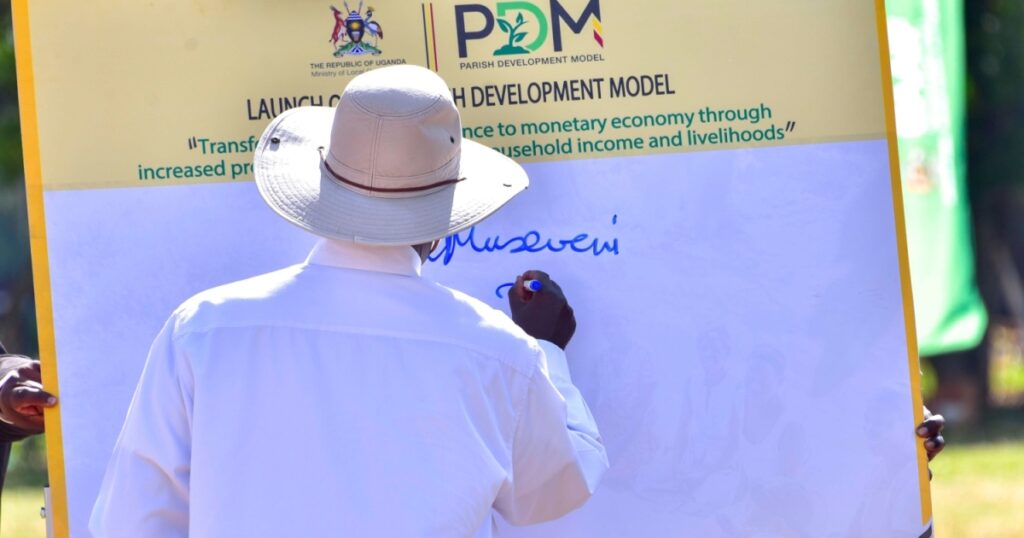The 2023/24 Auditor General (AG) report has uncovered widespread theft and mismanagement of Parish Development Model (PDM) funds, revealing that fraudulent activities are undermining this grassroots poverty alleviation initiative.
Edward Akol, the Auditor General, presented the findings to Parliament, exposing systematic fraud facilitated through duplicated national identification numbers (NINs), ghost cooperatives, and misallocation of funds.
Duplicated IDs and Ghost SACCOS
One of the most alarming findings is the use of duplicate NINs to siphon off funds. A total of 902 individuals accessed loans amounting to sh896 million, using either duplicated NINs, identical names, or shared phone numbers.
These loans were approved despite glaring irregularities in the data.
In addition to individual fraud, 567 Savings and Credit Cooperative Organizations (SACCOS) were found to be entirely non-existent.
These ghost entities, spanning 41 local governments, served as channels for embezzlement.
Misuse of Technology and Payment Platforms
The Parish Development Model relies on the WENDI payment platform, developed by PostBank Uganda with mobile network collaborations.
However, sh41.7 billion was disbursed outside the platform, violating set guidelines. Of the 13 financial institutions meant to integrate with WENDI, only four have fully connected, delaying transparency and oversight.
Nonexistent and Ineligible Projects
A staggering 342 beneficiaries across 253 SACCOS implemented ineligible projects, while another 170 beneficiaries engaged in projects that did not exist at all. In total, sh286 million remains unaccounted for, with beneficiaries failing to provide any supporting documentation.
Lack of Accountability
The audit found that of the 5,865 parishes that received PDM funds, only 169 provided evidence of identified priorities. Furthermore, 212 SACCOS across 14 local governments could not account for sh1.544 billion in Parish Revolving Fund (PRF) withdrawals.
Crop Mismanagement and Seasonal Timing Issues
Funds allocated for agricultural projects were frequently mismanaged, with disbursements occurring outside of planting seasons.
The audit highlighted irregularities in crop production projects, further indicating poor planning and execution.
Structural and Administrative Challenges
The audit exposed gaps in the PDM’s implementation.
Over 2,985 SACCOS lacked registered offices, and 2,898 failed to display signboards with their names and addresses.
This absence of basic infrastructure adds to the challenges of tracking and monitoring funds.
Presidential Directive on PDM Fraud
President Yoweri Museveni has taken a hardline stance on the theft of PDM and Emyooga funds, warning that perpetrators will be denied bail and held accountable.
During an assessment in 2023, Museveni directed police commanders to refuse bonds for individuals accused of embezzling PDM funds, signaling a zero-tolerance policy.
Other Cases of Embezzlement
The AG’s report highlighted specific instances of theft:
- Nathan Twinomujuni, secretary-general of the Uganda Liberal Teachers Union SACCOS, was arrested for alleged theft of teachers’ funds.
- In Mbarara district, Victor Twinomujuni, a youth leader, was charged with stealing Emyooga funds.
- A crackdown in Butaleja district, led by Eva Nalongo Kwesiga, resulted in the arrest of six individuals, including SACCOS leaders accused of extortion and embezzlement.
Urgent Reforms Needed
The AG has called for immediate reforms to address the systemic issues undermining the PDM program. Key recommendations include improving technology integration, strengthening administrative oversight, and addressing logistical and staffing challenges.
The PDM, initially launched in 2022 to reduce poverty at the grassroots level, has fallen victim to widespread fraud.
To restore credibility and ensure effective implementation, accountability and robust reforms are imperative.

